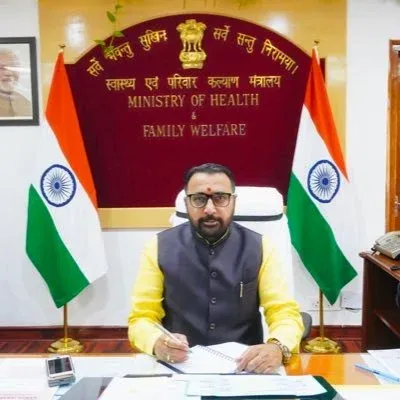How Much Funding Has Been Approved for Health Infrastructure by the Government?

Synopsis
Key Takeaways
- Rs 33,081.82 crore allocated to health infrastructure.
- Investment spans from FY 2021-22 to FY 2025-26.
- Focus on building 10,609 building-less AAMs.
- Establishment of 621 CCBs in populous districts.
- Strengthening health systems for better future preparedness.
New Delhi, July 22 (NationPress) To enhance public health infrastructure, a significant total of Rs 33,081.82 crore has been sanctioned for States and Union Territories (UTs) covering the financial years from 2021-22 to 2025-26, as disclosed by Prataprao Jadhav, the Union Minister of State for Health and Family Welfare, during a session in Parliament on Tuesday.
The Minister emphasized the initiatives under the Pradhan Mantri Ayushman Bharat Health Infrastructure Mission (PM-ABHIM), which aims to bolster the capabilities of health systems and institutions at primary, secondary, and tertiary levels. Enhanced infrastructure is vital for effectively tackling both current and future pandemics or emergencies.
“Administrative approvals have been granted to States/UTs for the fiscal years 2021-22 through 2025-26, totaling Rs 33,081.82 crore,” Jadhav remarked.
The allocated funds are being utilized to build and fortify 10,609 building-less Ayushman Arogya Mandirs (AAMs); 5,456 urban AAMs; 2,151 block public health units (BPHUs); 744 integrated public health laboratories (IPHLs) at the district level; and 621 critical care hospital blocks (CCBs), according to the Minister.
PM-ABHIM is a Centrally Sponsored Scheme (CSS) with certain Central Sector Components (CS), featuring a total budget of Rs. 64,180 Crores for the scheme duration (2021-22 to 2025-26).
The initiative targets the establishment of 17,788 building-less Sub-Centres as Ayushman Bharat-Health and Wellness centres, referred to as AAMs, during this timeframe.
Additionally, it aims to create 11,024 health and wellness centres, now termed U-AAMs, in urban locales, emphasizing slum and slum-like regions; 3,382 BPHUs at the block level; and 730 district IPHLs across the nation, with each district set to have one such laboratory.
The funds will also be directed towards setting up 602 CCBs in all districts with a population exceeding 5 lakhs.






